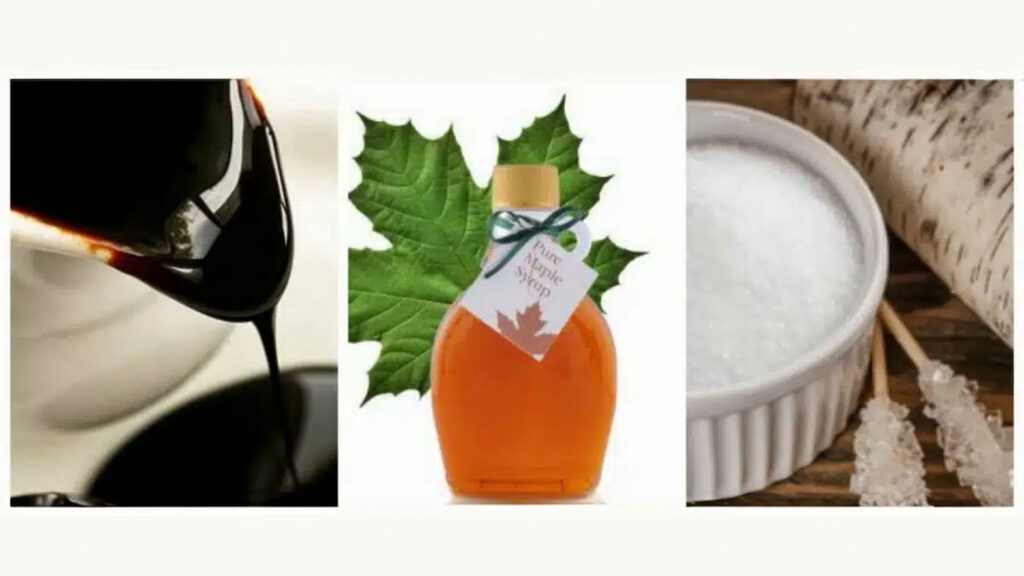
There are several different sugars and sugar alternatives out there. So, which do you choose? What difference do they make? How do they impact your health?
Sugar (sucrose)- Plain, white granulated sugar. What is it? We all know what it is. It’s the most commonly used sweetener and the majority of us have some in our kitchens. It comes from either sugar cane or sugar beets. It is made by dissolving and purifying raw sugar using phosphoric acid. White refined sugar is typically sold as granulated sugar, which has been dried to prevent clumping.
So, with that being said, how does regular granulated sugar impact your health? It can suppress the immune system, upset the body’s mineral balance, promote tooth decay, produce an acidic stomach, cause hormonal imbalance, increase bacterial fermentation in the colon, and so many other things.
From that we can conclude that plain, common white sugar is probably not the best thing to be putting in our bodies.
What are some alternatives?
Organic Evaporated Cane Juice- Evaporated cane juice is also harvested from sugar cane. It is less refined, so it remains a light tan color and retains some of the nutrients found in sugar cane juice. It is processed by boiling to evaporate most of the water in the juice.
Nutrition-wise, it’s still sucrose. It’s just much less processed, thus retaining many more nutrients. It still provides calories and will still have a similar impact to white sugar.
Brown Sugar- Again, it’s still sucrose originating from the sugar cane. The difference between it and white sugar is the presence of molasses.
Brown sugar has a slightly lower caloric value by mass than white sugar due to the presence of water. One hundred grams of brown sugar contains 373 calories, as opposed to 396 calories in white sugar. However, brown sugar packs more densely than white sugar due to the smaller crystal size and may have more calories when measured by volume.
Molasses- Molasses is the dark, sweet, syrupy byproduct made during the extraction of sugars from sugarcane and sugar beets. Molasses can vary in color, sweetness, and nutritional content depending on the variety or how much sugar has been extracted.
One tablespoon of molasses contains 20% of the daily recommended intake for calcium, 22.5% of the daily recommended intake for magnesium and almost 40% of the recommended daily intake for iron. There are also claims that blackstrap molasses is good for hair, has laxative qualities, and is a safe sweetener for diabetics.
Honey- Unlike all the previous sweeteners, honey does not come from the sugar cane or sugar beets. It is made by bees using nectar from flowers. Honey has had a long history in human consumption and is used in various foods and beverages as a sweetener and flavoring.
Honey is 80% natural sugar made up of laevulose and dextrose and is sweeter than white sugar. The vitamins present in honey are B6, thiamin, niacin, riboflavin, pantothenic acid and certain amino acids. The minerals found in honey include calcium, copper, iron, magnesium, manganese, phosphorus, potassium, sodium and zinc.
Honey will never spoil, so it’s a great choice for food storage.
Pure Maple Syrup- This is a 100% natural food product, processed by the coiling and concentration of maple sap. maple sap is a sterile, clear liquid that provides maple trees with water and nutrients before the tree buds and leaves open in the spring. In the boiling of the sap, concentration of the syrup, and filtering processes, all the nutrients remain in the finished syrup. Like honey, maple syrup is used as a sweetener as well as a flavoring.
Pure maple syrup contains potassium, calcium, magnesium, manganese, sodium, phosphorus, iron, zinc, and copper. As far as vitamins go, it contains B5, B2, B6, A, niacin, biotin, and folic acid.
Xylitol- Xylitol is a sugar produced from birch trees. It is widely used as a sugar substitute. Unlike most of the commonly used sugar substitutes, xylitol is a naturally occurring substance. It is twice as sweet as sugar, so you only need to use half the amount when substituting for white sugar.
It is safe for your teeth as it doesn’t eat away and the enamel. It is prebiotic (encourages healthy gut flora) and has antibacterial properties. Xylitol is absorbed more slowly than sugar. In fact, it’s not even completely broken down in our system. As such, it does not cause a rapid spike in blood glucose. Xylitol is typically a wonderful substitute for diabetics as it has little effect on glucose and none on insulin.
Save

Kitchen Kneads is your one-stop shop for quality grains, flour, kitchen appliances, and other ingredients.
We are Utah’s premier baking and cooking resource!
Questions?


Kitchen Kneads is your one stop shop for quality grains, flour, kitchen appliances and other ingredients. We are Utah’s premiere baking and cooking resource! Questions?
888-881-9957
info@kitchenkneads.com
2022 | Kitchen Kneads | All Rights Reserved | Privacy Policy | Terms | XML Sitemap | Site by PDM